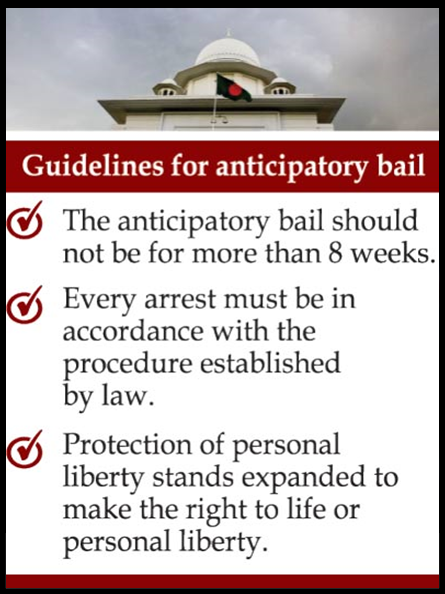LIMITED ANTICIPATORY BAIL ACROSS STATE BORDERS: SC VERDICT
Why in the News ?
- The Supreme Court, in a significant ruling, has allowed Sessions Courts or High Courts in a state to grant “limited” anticipatory bail to an accused, even if the First Information Report (FIR) is registered outside their jurisdiction.
Source: The Financial Express
Context: Matrimonial Dispute Case
- The ruling originated from a matrimonial dispute case where a husband was granted anticipatory bail by a Sessions Court in Karnataka, despite the FIR being registered in Rajasthan.
Constitutional Imperative and Judicial Discretion
- Upholding the constitutional imperative to protect citizens’ rights, the SC emphasized that High Courts and Sessions Courts have the authority to grant limited anticipatory bail under Section 438 of the CrPC.
- Justices B V Nagarathna and Ujjal Bhuyan stressed the importance of judicial discretion in the interest of justice.
Avoiding Anomalies and Injustice
- The bench cautioned against interpreting the law in a way that would lead to an absolute bar on the jurisdiction of the Sessions Court or High Court in such cases.
- An absolute bar could result in unjust consequences for genuine applicants facing wrongful or politically motivated prosecution.
Exceptional Circumstances Requirement
- The SC ruled that the exercise of such jurisdiction should be in “exceptional and compelling circumstances only.”
- The court clarified that denial of anticipatory bail should only happen if it causes irreparable and irreversible prejudice to the applicant.
Conditions and Safeguards
- The SC outlined conditions for granting interim protection, including providing notice to the investigating officer and public prosecutor involved in the FIR.
- It emphasized that the discretion to grant anticipatory bail should be exercised judiciously and with recorded reasons.
Preventing Potential Abuse
- The court acknowledged the potential for accused individuals to choose a court for interim protection, leading to possible abuse of the system.
- To prevent abuse, the SC highlighted the importance of a “territorial connection/proximity between the accused and the territorial jurisdiction of the court” approached for relief.
This judgement provides clarity on the scope and conditions under which anticipatory bail can be granted across state borders, emphasizing the need for careful consideration and adherence to specified conditions.

 Source: The Financial Express
Source: The Financial Express

